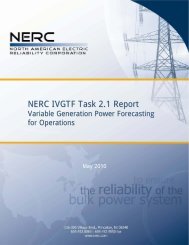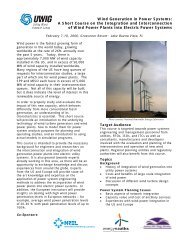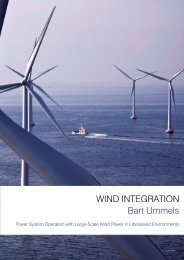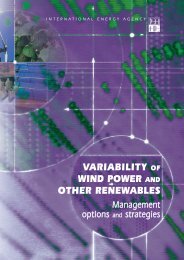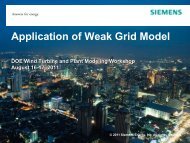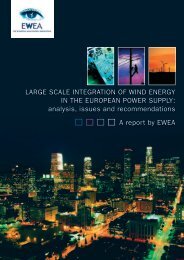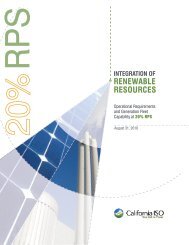Integrating Southwest Power Pool Wind to Southeast Electricity ...
Integrating Southwest Power Pool Wind to Southeast Electricity ...
Integrating Southwest Power Pool Wind to Southeast Electricity ...
Create successful ePaper yourself
Turn your PDF publications into a flip-book with our unique Google optimized e-Paper software.
Table 5-15<br />
Change in generation for Scenario 3 with low gas prices<br />
The change in generation between Scenarios #3 and #2 with low gas prices is given in Table<br />
5-16. There is now very little difference in CC usage; most of the benefits that come from<br />
moving <strong>to</strong> larger reserve sharing areas now comes from the fact that this allows a reduction in<br />
less efficient GTs and increase in coal. This results in small increases in generation in SPP and<br />
the SERC non-wind regions, with a decrease in TVA and SBA where GTs had been providing<br />
significant amounts of energy. Comparing this with Table 5-10, it can be seen that there is now<br />
far less difference between scenarios; the benefits of cooperating across the footprint is reduced<br />
as costs are more equal throughout the region with coal and gas being somewhat similar. There is<br />
still a small move <strong>to</strong> more efficient (in the model) CC in SPP compared <strong>to</strong> CC elsewhere, but<br />
<strong>to</strong>tal CC usage is not decreased as gas prices are so low that this is not as desirable as it was with<br />
higher gas prices.<br />
Table 5-16<br />
Change in generation Scenario 3 vs. 2 low gas price<br />
The net effect of reduced gas prices on cost is <strong>to</strong> reduce the cost difference from approx.<br />
$0.7/MWh <strong>to</strong> approx. $0.25/MWh, a fac<strong>to</strong>r of three. The benefits now are not in being able <strong>to</strong><br />
switch from CC usage <strong>to</strong> coal when sharing reserve requirements, but the less attractive (as less<br />
MWh) benefits of switching from GTs <strong>to</strong> coal and being able <strong>to</strong> use the more efficient coal and<br />
CC units. It is unclear how increasing relative costs of coal (by having carbon price for example)<br />
may affect these results. Coal may be reduced further, and shared reserve requirements may<br />
allow greater usage of CC, but that has not been modeled.<br />
5-32




